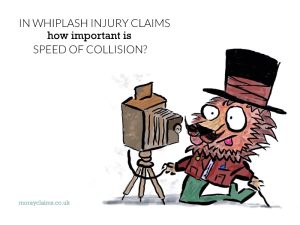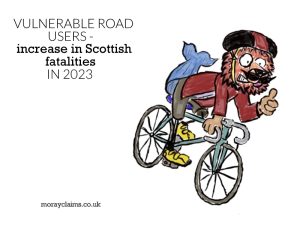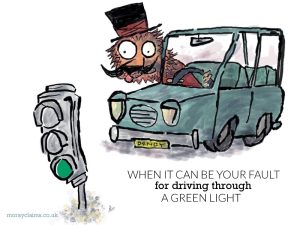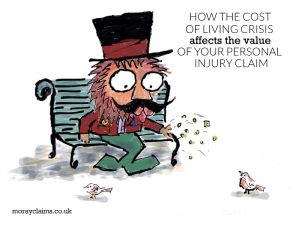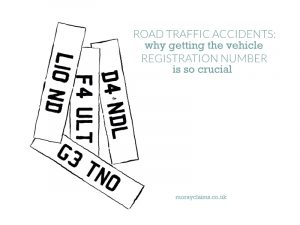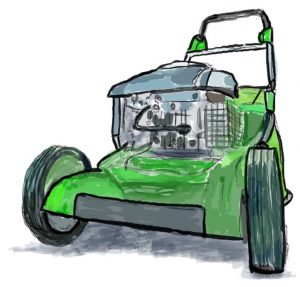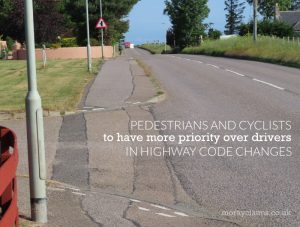By definition, whiplash injuries are caused by low velocity impacts. The perpetual difficulty we have in describing whiplash injuries stems from the fact that there is, by definition, no structural pathology (i.e. nothing that can be independently verified by x-rays or other scans) They say that whiplash-associated disorders remain 'a diagnosis of exclusion'. In other words, if you seem to be dealing with 'appropriate' symptoms and nothing else would explain them, "whiplash" is your diagnosis because you have excluded all other possibilities. What is the mechanism of a whiplash injury? The mechanism of a whiplash injury involves the initial acceleration of the vehicle occupant due to force being transmitted through the vehicle in which they are seated - typically, a rear-end shunt of their vehicle. This results in the occupant to moving forward. In moving forward, the occupant’s head and upper cervical spine (neck) lags behind very slightly compared to the movement Continue Reading
Rise in fatalities among vulnerable road users in Scotland
Recently-released statistics have shown that as compared with 2022, 2023 saw a reduction in the overall number of deaths on Scotland’s roads. This is good news. However, lurking within these statistics, there was, unfortunately, an increase in deaths within the sub-category for vulnerable road users. Vulnerable road users include motorcyclists, pedal cyclists and pedestrians. The figures for serious injuries within each of these subcategories also showed an increase as between 2022 and 2023. The indications are that, for car users, road safety levels continued to improve. But if you are walking or travelling on two wheels, it is more of a bleak picture. Given that we are all being encouraged to engage in more active forms of travel (e.g. walking and pedal cycling), the signs are that the Government is going to need to do more to reassure the public that proper safety measures are being put in place (e.g. separated-from-carriageway active travel routes such as Continue Reading
When it can be your fault for driving through a green light
You’re in a rush. It’s a dark, wet Monday morning in January. You want to cross the main road on foot at traffic lights, using the pedestrian crossing there; but the lights are green for vehicles - and red for you to cross. On the approach to the traffic lights for vehicles, there are two bus stops. It’s a predominantly residential area. You decide you have to risk crossing on red. Dashing onto the crossing, you suddenly realise an approaching car is bearing down on you. It’s about 5m away and travelling close to the speed limit of 30mph. Your brain freezes with panic. You've misjudged the speed of the oncoming vehicle. You’re rooted to the spot. Paralysed with fear. It's too late to get out of the way. Though the car driver instinctively swerves to avoid you, having only noticed you late, the collision is inevitable. The impact throws you up onto the bonnet. Your head hits the nearside windscreen, causing a “bullseye” break in the glass - i.e. a spider’s web-like Continue Reading
How the Cost of Living Crisis affects the Value of Your Personal Injury Claim
In July 1971, a sliced white loaf of bread would have cost you 10 pence. In July 2021 the cost would have been £1.06. The Retail Price Index ("RPI") shows an average cost for the same loaf of bread as £1.36 in July 2023. The rise in prices over time is known as inflation. It can also be described as the decline of purchasing power over time. In the present Cost of Living Crisis, the upward trend in prices is affecting most things and that includes personal injury compensation (compensation also sometimes referred to as “damages”). The injury part - for the "pain and suffering" associated with the injuries - of a personal injury compensation claim is just one element of the value of the claim as a whole. Other elements can include wage loss and necessary travel expenses. In this article, we are only discussing the injury part of personal injury claims. This can be variously described as "pain and suffering", General Damages and solatium. Continue Reading
A cautionary tale about dangers from weedkiller in Moray
Usually, a headline like that warns you about possible dangers from your own carelessness. It’s much worse than that here, unfortunately. This article contains a warning about how you – and especially your pets – might be at risk from lack of care on the part of your own local authority. The practices of Moray’s local authority in relation to weed killing mean pet owners must be extra vigilant. Rinaldo Coluccia’s 8-year-old German Shepherd dog, Honey, died as a result of ingesting Glyphosate (a herbicide) beside “The Walkies” path (by the A96) in Forres. The Council had treated the area in order to destroy Giant Hogweed plants. The Council’s risk assessment provided that warnings should be given to the public where areas had recently been sprayed. “Control measures” within the risk assessment included: “Keep pets on lead when passing area (sic) which have had herbicide application recently.“, and “Prevent pets from eating/chewing vegetation applied with Continue Reading
Claims for Death of a Relative in Scotland – Another milestone?
Elgin's Dandy Lion has not had a view up the High Street to Dr Gray's Hospital since May 2018. In the meantime, his view has been blocked by wooden hoardings as Poundland first had structural problems and then a fire. We’ve had piles of metal on the site, from the “scaffolding mountain” to the beginnings of the new Poundland construction. In the various photos below, there is a similarity but there's also gradual progress. In the law relating to bereavement compensation in Scotland, there can be a superficial sameness to things but, again, under the surface, there is progress and milestones are being achieved. We’ll look at one of these progression points in this article. For fatal accident claims, in Scotland, this is one area where the law is quite different to that in England and Wales. This is particularly the case for compensation awarded for the grief and sorrow caused by deceased’s death – often referred to as compensation for “loss of society”. Those pushing Continue Reading
Why the crucial road accident information to get is the registration number
If you have been injured as a result of a road traffic accident, although it is the driver of the vehicle at fault for the accident who bears the blame, it is their insurance company that will pay your compensation in most cases. As a result, you and your solicitors want to find out as quickly as possible who those insurers are and how best to contact them. There is a lot of information you can usefully gather to give to your solicitor following a road traffic accident but what do you think is the single most important piece of information? What you absolutely want to get if you can is the registration number of the vehicle which caused the accident. This applies whether you were In the “best case”, you will be well enough and quick-witted enough to get the registration number yourself. But that won’t always be the case, especially if you have been seriously hurt in the accident. In this article, we will look at three reasons why getting the registration number Continue Reading
How Grigor & Young help you with a road traffic accident injury claim in Moray
Grigor & Young LLP, Solicitors, use Moray Claims as a trading name in their business of dealing with personal injury compensation claims for clients. Grigor & Young have offices in Elgin and Forres, Moray. Personal injury compensation claims arising from road traffic accidents are usually against insurers of the driver who was to blame for the accident. If that driver was uninsured or is untraced, the claim may be against the Motor Insurers' Bureau. Injuries resulting from road traffic accidents can happen in many different ways. If we take on your claim at G&Y, it will be via one of the following three funding methods. Legal aid Whether you qualify for legal aid depends upon your financial circumstances. If you qualify for legal aid, we will give close consideration to using that as the funding mechanism for the claim though we will also discuss with you the other options mentioned below. Note that, if your claim is successful under any form Continue Reading
How Grigor & Young will help you with your accident at work claim in Moray
Moray Claims is a trading name of Grigor & Young LLP, Solicitors. Grigor & Young have offices in Elgin and Forres, Moray. Accidents at work cover a wide range of accidents. If we take on your claim at G&Y, we will do so in one of three ways. Legal aid Eligibility for legal aid will depend on your financial circumstances. If you qualify for legal aid, we will give serious consideration to using that as the funding mechanism for the claim but we will also discuss with you the other options mentioned below. Note that if your claim is successful under any form of Scottish legal aid, you will receive 100% of your compensation. The legal aid rules prevent your solicitor taking any form of Success Fee as a deduction from your compensation. "Before the event" (BTE) insurance This is a type of legal expenses insurance which you may have attached to buildings or contents insurance, for example. Many people have this type of legal expenses insurance cover Continue Reading
Whiplash Claim in Scotland? Make sure you apply the right rules
In Scotland, we are used to being lumped in with England and other parts of the UK in all sorts of situations where that may be misleading or even wrong. Sometimes the law is the same in Scotland as in the rest of the UK and sometimes it’s not. Personal injury claims are usually based upon negligence of one person causing injury to another. The modern law of negligence for the UK (and much of the world) is based on the Scottish “snail in the ginger beer bottle” case of Donoghue –v- Stevenson. But some areas of personal injury law differ markedly between the jurisdictions. For example, the law relating to claims in cases of fatal accidents and payment of bereavement damages to relatives of deceased persons. Scotland has had a more ‘generous’ compensation scheme in this type of case than the rest of the UK for a long time. But one area where there has been a parting of the ways between Scotland, on the one hand, and England and Wales, on the other, has come as recently as May Continue Reading
How an “off” petrol lawnmower can still be a powered-blade injury risk
Imagine you've been cutting grass with a self-propelled rotary petrol mower - like the ones shown in various images in this article. (You don't 'push' such lawnmowers. They are propelled along by their engines). You stop the engine to adjust the height of the blade. While you're doing that, completely without warning and unexpectedly, the motor restarts of its own accord. The blade spins into action and you suffer serious injury to your hand as a result. Statistics from the USA show that there was an average of about 85,000 lawnmower-related injuries annually in the period 2005 to 2015. The most commonly injured body parts were the hand/finger (22%) followed by the lower extremities (i.e. toes) (16%). Men were more than 3 times as likely to be injured as women. The annual number of lawnmower-related injuries showed no decrease during the period 2005 to 2015. The purpose of this article is to highlight a particular risk associated with petrol-driven Continue Reading
Pedestrians and cyclists to have more priority over drivers in Highway Code changes
Walking and cycling have become more popular during the pandemic. So-called “active travel” has benefits for personal health as well as the environment. Department for Transport figures show that, over the last year, there’s been a 46% increase in the number of miles cycled on British roads. Tellingly, that’s a larger increase than in all of the previous 20 years combined. To take even one corner of Moray as an example... While the Lossiemouth - Elgin cycle path beside the A941 has been an active travel benefit for many years, the long-mooted track to connect Lossiemouth to Hopeman has only recently gained significant traction, despite years of campaigning. Now that the charitable organisation (SCIO) Laich of Moray Active Travel Routes is in existence, and with help from Sustrans, a connection between Lossiemouth and Covesea is coming. Hopefully, the final link from Covesea to Hopeman - to cover places such as the Green Road, Gordonstoun and Duffus - will not be far Continue Reading
